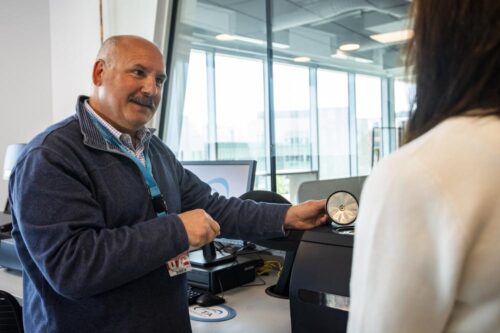
The Roux Institute and partners earn Maine a federal “Tech Hubs” designation
In late January of 2020, only a few weeks after Northeastern University’s Roux Institute opened its doors in Portland, Maine, The New York Times published an article titled “A $100 Million Bet That Vacationland Can Be a Tech Hub Too.” The article described how the Roux Institute was aiming to establish itself as a learning and research institute that would make Maine a leader in innovation.
Only three years later, the Roux Institute has been named as part of a consortium of over 30 organizations around the state to receive a federal “Tech Hub” designation, a high-visibility endorsement from the United States government of the progress the Roux Institute has made against its goal to make Maine a tech leader.
The Tech Hubs Program is a federal program enacted this year to invest in regions across the country that have the assets and resources to become globally competitive in a certain technology or industry. Maine, one of 31 regions in the country to receive the designation, was named a Forest Bioproducts Advanced Manufacturing Tech Hub – a designation that makes sense, given Maine’s long history as a major player in the forestry industry. The designation recognizes that Maine has the resources and technology to become a global leader in producing sustainable wood biomass polymers – or, more simply put, developing wood fiber bioproducts that will sequester carbon and act as an earth-friendly alternative to plastics and toxic chemicals.
The consortium of Maine organizations that applied for designation was led by the Mills Administration and the Maine Technology Institute. The designation comes with a Tech Hubs Strategy Development Grant, a “Phase One,” $500,000 award that will be used by the consortium of Maine partners to further coordinate and plan Maine’s capacity to manufacture and commercialize advanced industry technologies. The designation also prequalifies Maine for “Phase Two” of the program, which presents an opportunity for a $45-$65 million grant that will help Maine actually deploy and expand these advanced Industry 4.0 practices and processes to its bioproduct manufacturing companies in the coming years.
Maine already has deep historical ties to forestry and wood-based products. With this designation and grant, we have the opportunity to reinvigorate and advance this industry in a modern, sustainable way.

Jack Lesko
Director of Engineering Research, the Roux Institute
The Roux Institute will play a multi-faceted role in Phase One of the Tech Hubs program, providing commercialization support to biomanufacturing firms in Maine, working with them to help identify opportunities for innovation and then devising and deploying those solutions.
Jack Lesko, director of engineering research at the Roux Institute, has been working closely with the governor’s office and partners around the state to help make this designation come to fruition. He sees it as a recognition from the federal government of the huge opportunity Maine has to build upon and strength an economy that is such an integral part of Maine’s history.
“Maine already has deep historical ties to forestry and wood-based products,” Lesko says. “With this designation and grant, we have the opportunity to reinvigorate and advance this industry in a modern, sustainable way.”
At the Roux Institute, this will happen across all four of the institute’s offerings: research, entrepreneurship, learning, and partnerships. The Roux Institute’s engineering research group, led by Lesko, brings extensive experience in manufacturing and materials. These researchers, along with partners at University of Maine, Maine Manufacturing Extension Partnership, and Maine Technology Institute, will partner with manufacturers around the state to help them identify opportunities for innovation, and to create and implement advanced manufacturing technologies.
The Roux Institute’s entrepreneurship team, which accelerates startups in its various Founder Residency programs, has already worked with two early-stage companies developing bioproduct material innovations. The Tech Hub designation and grant will allow the team to expand their ability to support bioproduct manufacturing startups and help them integrate data science, robotics, automation, and other advanced techniques into their processes.
The Tech Hubs application process was a true team effort. We’re proud to be a part of this consortium and eager to play our part in making Maine a global leader in bioproduct manufacturing.

Mike Pollastri
Senior Vice Provost and Academic Lead, the Roux Institute
The Roux Institute’s Associate Vice President of Entrepreneurship & Venture Creation, Chris Wolfel, says that bioproduct startups that are in residency at the Roux Institute will be able to take advantage of the research and partnership happening as a result of the Tech Hubs Program and grant.
“We’re excited to leverage our rapidly growing entrepreneurship programs to support the impactful work happening around the state of Maine. There are so many opportunities for new businesses to grow and thrive in this sector,” Wolfel said.
Lesko notes that with the development of advanced manufacturing practices to support the burgeoning bioproducts manufacturing industry, the state will also need to develop a pipeline of workers who are trained in these new processes and technology. This means opportunities for the Roux Institute’s custom-learning team to create classes, short courses, learning modules, and more that will help train new workers and upskill existing workforces with the capabilities to work with new technologies.
Lesko believes the most important outcome of Maine’s bioproduct manufacturing Tech Hub is the positive impact it will have on Maine people and communities.
“The work coming out of this will help us enable job growth here in Maine through advanced manufacturing. We have a real opportunity to make a difference in our local communities. That’s what really inspires me. That’s why I’m here,” Lesko says.

In a press release announcing the Maine’s Tech Hub designation, Maine Senator Angus King expressed a similar sentiment.
“Maine’s forest products industry and spirit of innovation have each been major contributors to our state’s history, culture, and economic success,” he said. “This new announcement from the Biden Administration designating the Forest Bioproducts Advanced Manufacturing Tech Hub as a key hub for rapid growth is clear proof that Maine continues to lead the way in supply chain resiliency and good-paying jobs.
Mike Pollastri, senior vice provost and academic lead at the Roux Institute, emphasizes how important strong partnership is in the advancement of Maine’s economy. “The Tech Hubs application process was a true team effort. The Mills Administration and MTI did an amazing job connecting industry partners and bringing us together to achieve something truly groundbreaking for the state of Maine. We’re proud to be a part of this consortium and eager to play our part in making Maine a global leader in bioproduct manufacturing.”
